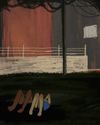Emily Gosling investigates how today’s designers are tapping into the deliberately chaotic, cut ’n’ paste approach that zines from the 70s and 90s made their own

The word zine is simply a shortened version of magazine, or more usually, fanzine, but in its snappier, four-letter form it has far more significant connotations. ‘Zine’ – at least, in its origins – speaks of bedroom activism, of punk, of the dissemination of ideas that otherwise may not be circulated: those around queer sexualities perhaps, or underground music scenes, or simply fandoms so niche there isn’t a hope in hell of seeing them in print-titles-proper.
The aesthetic most of us associate with zines today – a visual chaos of cut-and-paste imagery, deliberately scrappy approaches to layout, maelstroms of numerous different typefaces, strange photographic crops, hand-scrawled notations – exploded in the 1970s with the birth of punk. Vitriol and ebullience alike were expressed in print as hastily put-together pages that indulge in their underground, countercultural status; the most famous of which are Sniffin’ Glue, Mark Perry’s zine from 1976 to 1977, and its US peer Search and Destroy, published by V Vale between 1977 and 1979.
Esta historia es de la edición Spring 2019 de Computer Arts - UK.
Comience su prueba gratuita de Magzter GOLD de 7 días para acceder a miles de historias premium seleccionadas y a más de 9,000 revistas y periódicos.
Ya eres suscriptor ? Conectar
Esta historia es de la edición Spring 2019 de Computer Arts - UK.
Comience su prueba gratuita de Magzter GOLD de 7 días para acceder a miles de historias premium seleccionadas y a más de 9,000 revistas y periódicos.
Ya eres suscriptor? Conectar
Creative Space
Without’s creative director roly grant on the studio’s hand-crafted ethos
studio profile
A leading light in the branding industry, Wolff Olins wants to harness its scale to help change the world

network
THE CREATIVE COMMUNITY HAS COME TOGETHER LIKE NEVER BEFORE, TO HELP EACH OTHER GET THROUGH THE CORONAVIRUS PANDEMIC

project
ethos for 305 Fitness - Learn how the Montreal identity design studio rebranded one of America’s hottest fitness clubs

rebrand
WHAT’S THE EXPERT OPINION ON PENTAGRAM’S BRAND IDENTITY REFRESH OF THE GLOBAL TOY COMPANY FISHER-PRICE?
opinion
CRAIG BLACK HAS SOME ADVICE FOR SURVIVING THE CORONAVIRUS CRISIS AS AN INDEPENDENT CREATIVE

fresh eyes
DUNCAN BRAZZIL ON HOW THE UK INSPIRED HIS CAREER

artist insight
Cindy Kang on how photography informs her illustration work
ANIMATION NOW
LEADING PRODUCERS AND FILMMAKERS REFLECT ON EMERGING TRENDS AND SHARE THEIR PREDICTIONS FOR THE YEAR AHEAD
Project: Atoll by Studio Myerscough
Morag Myerscough reveals how she and Luke Morgan designed a vibrant biophilic installation in a central London office tower studiomyerscough.com